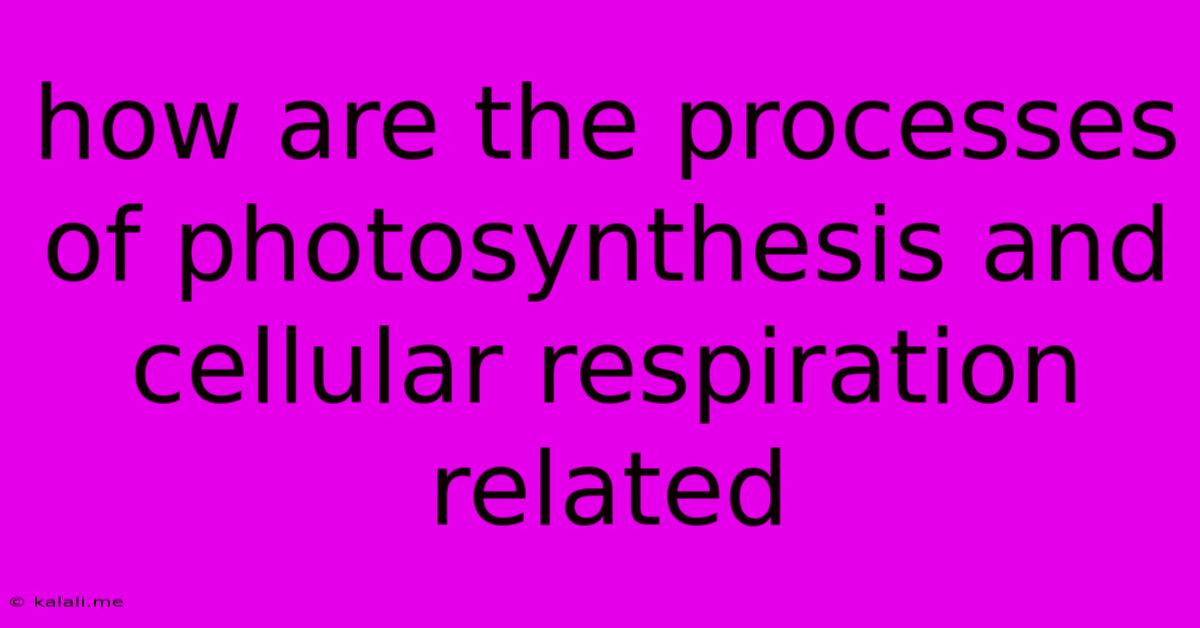How Are The Processes Of Photosynthesis And Cellular Respiration Related
Kalali
May 10, 2025 · 3 min read

Table of Contents
How Photosynthesis and Cellular Respiration Are Related: A Symbiotic Dance of Energy
Photosynthesis and cellular respiration are two fundamental processes in biology, often described as opposites. While seemingly distinct, they are intricately linked in a cyclical relationship that sustains almost all life on Earth. This article will explore the interconnectedness of these vital processes, highlighting their complementary roles in energy transfer and the cycling of essential elements. Understanding their relationship is crucial to comprehending the flow of energy within ecosystems and the very basis of life itself.
Photosynthesis: Capturing Sunlight's Energy
Photosynthesis, primarily performed by plants, algae, and some bacteria, is the process of converting light energy into chemical energy in the form of glucose (a sugar). This process occurs in chloroplasts, specialized organelles within plant cells. The overall equation is relatively simple:
6CO₂ + 6H₂O + Light Energy → C₆H₁₂O₆ + 6O₂
This equation shows that carbon dioxide (CO₂) and water (H₂O) are utilized, along with light energy, to produce glucose (C₆H₁₂O₆) and oxygen (O₂). This glucose serves as the plant's primary source of energy and building block for other organic molecules. The oxygen released is a byproduct, but crucially, it is the oxygen that we breathe.
Cellular Respiration: Harvesting Energy from Glucose
Cellular respiration is the process by which organisms break down glucose to release the stored energy. This occurs in the mitochondria, the "powerhouses" of cells. It's essentially the reverse of photosynthesis, though not a direct reversal. The simplified equation is:
C₆H₁₂O₆ + 6O₂ → 6CO₂ + 6H₂O + ATP
This equation demonstrates the breakdown of glucose (C₆H₁₂O₆) using oxygen (O₂) to produce carbon dioxide (CO₂), water (H₂O), and adenosine triphosphate (ATP). ATP is the primary energy currency of cells, providing the energy needed for various cellular processes, from muscle contraction to protein synthesis. Both aerobic (requiring oxygen) and anaerobic (not requiring oxygen) forms of cellular respiration exist, but aerobic respiration is significantly more efficient.
The Interdependent Cycle: A Closed Loop
The relationship between photosynthesis and cellular respiration is beautifully symbiotic. Photosynthesis produces glucose and oxygen, which are then used by organisms (including plants themselves) in cellular respiration to generate ATP. The carbon dioxide and water released during cellular respiration are then utilized by plants in photosynthesis, completing the cycle. This continuous exchange of materials and energy forms the basis of most food chains and ecological processes.
- Oxygen Production and Consumption: Photosynthesis produces the oxygen needed for aerobic cellular respiration, while cellular respiration consumes the oxygen.
- Carbon Dioxide Exchange: Cellular respiration releases carbon dioxide, which is used by plants in photosynthesis.
- Glucose Production and Utilization: Photosynthesis produces glucose, the primary energy source utilized in cellular respiration.
- Energy Transformation: Photosynthesis converts light energy into chemical energy (glucose), while cellular respiration converts chemical energy (glucose) into usable cellular energy (ATP).
Beyond the Basics: Variations and Importance
While this simplified explanation highlights the core relationship, variations exist based on the type of organism and environmental factors. For instance, anaerobic respiration occurs in environments lacking oxygen. The efficiency of both processes is influenced by factors like temperature, light intensity, and water availability.
The interconnectedness of photosynthesis and cellular respiration is fundamental to the understanding of life on Earth. The processes are vital for maintaining atmospheric oxygen levels, regulating the carbon cycle, and supporting the complex food webs that sustain biodiversity. Disruptions to either process, such as deforestation or climate change, can have significant consequences for the entire planet.
Latest Posts
Latest Posts
-
The Ability To Say Clever And Funny Things
Jun 30, 2025
-
How Many Cups Are In A Pound Of Lard
Jun 30, 2025
-
Why Did Jerry Thompson And Kelly Nelon Divorce
Jun 30, 2025
-
Allen And Roth Patio Furniture Replacement Parts
Jun 30, 2025
-
How Many Minutes Are In 20 Miles
Jun 30, 2025
Related Post
Thank you for visiting our website which covers about How Are The Processes Of Photosynthesis And Cellular Respiration Related . We hope the information provided has been useful to you. Feel free to contact us if you have any questions or need further assistance. See you next time and don't miss to bookmark.